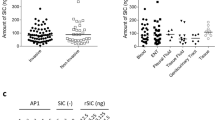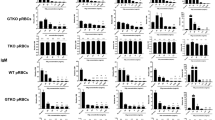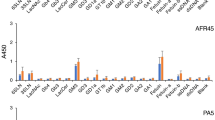Abstract
THE capacity of passively administered serum antibody to inhibit specific antibody formation1 has suggested that serum antibody may act as a type of “feedback” mechanism2–5. It is not known whether this effect of antibody results from its interaction with antigen or from a “direct” effect of some kind on the antibody-producing cells themselves5. A “direct” effect might be mediated by the Fc fragment of antibody, because this fragment, which does not contain the combining sites for antigen, is known to be essential for many other biological functions of antibody, such as complement fixation6, combination with skin7 and passage across the placenta8. The purpose of our experiments was to determine whether this fragment of the antibody gamma-globulin plays a part in the inhibition by antibody of specific antibody formation.
This is a preview of subscription content, access via your institution
Access options
Subscribe to this journal
Receive 51 print issues and online access
$199.00 per year
only $3.90 per issue
Buy this article
- Purchase on Springer Link
- Instant access to full article PDF
Prices may be subject to local taxes which are calculated during checkout
Similar content being viewed by others
References
Smith, T., J. Exp. Med., 11, 241 (1909).
Uhr, J. W., and Baumann, J., J. Exp. Med., 113, 935 (1961).
Sahiar, K., and Schwartz, R. S., Science, 145, 395 (1964).
Möller, G., Transplantation, 2, 405 (1964).
Rowley, D. A., and Fitch, F. W., J. Exp. Med., 120, 987 (1964).
Taranta, A., and Franklin, E. C., Science, 134, 1981 (1961).
Franklin, E. C., and Ovary, Z., Immunology, 6, 434 (1963).
Brambell, F. W. R., Hemmings, W. A., Oakley, C. L., and Porter, R. R., Proc. Roy. Col., London, Series B, 151, 478 (1960).
Adams, M. H., in Bacteriophages (Interscience Publishers, New York, 1959).
Uhr, J. W., and Finkelstein, M. S., J. Exp. Med., 117, 457 (1963).
Nisonoff, A., Wissler, F. C., Lipman, L. N., and Woernly, D. L., Arch. Biochem. Biophys., 89, 230 (1960).
Lowry, O. H., Rosebrough, N. J., Farr, L., and Randall, R. J., J. Biol. Chem., 193, 265 (1951).
Uhr, J. W., and Weissmann, G., J. Immunol., 94, 544 (1965).
Finkelstein, M. S., and Uhr, J. W., Science, 146, 67 (1964).
Spiegelberg, H. L., and Weigle, W. O., J. Exp. Med., 121, 323 (1965).
Author information
Authors and Affiliations
Rights and permissions
About this article
Cite this article
TAO, TW., UHR, J. Capacity of Pepsin-digested Antibody to inhibit Antibody Formation. Nature 212, 208–209 (1966). https://doi.org/10.1038/212208a0
Issue Date:
DOI: https://doi.org/10.1038/212208a0
This article is cited by
-
IgG-mediated immune suppression in mice is epitope specific except during high epitope density conditions
Scientific Reports (2018)
-
Functions of antibodies in the regulation of b ceil responses in vivo
Springer Seminars in Immunopathology (2001)
-
Erythroblastosis Foetalis. advances in management and prevention
La Ricerca in Clinica e in Laboratorio (1971)
Comments
By submitting a comment you agree to abide by our Terms and Community Guidelines. If you find something abusive or that does not comply with our terms or guidelines please flag it as inappropriate.



